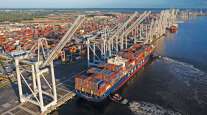Staff Reporter
Virus Will Take Toll on State Transportation Revenue, Experts Say

[Ensure you have all the info you need in these unprecedented times. Subscribe now.]
Experts indicate the coronavirus pandemic will have a significant negative effect on state revenue, including funding that supports transportation projects.
Due to dozens of statewide stay-at-home orders, fewer people are out on the road, meaning fewer people are purchasing fuel and bolstering state fuel tax revenue. Data from Inrix Inc., a transportation analytics group, indicates that nationwide personal travel has dropped. Inrix data shows nationwide personal travel was down 20% the week beginning March 14. Nationwide personal travel was down 42% the week beginning March 21, according to Inrix.
“That’s going to directly translate into a lot fewer gas tax dollars for states — and sometimes for local governments, too — to repair and expand their infrastructure networks with,” said Carl Davis, research director at the Institute on Taxation and Economic Policy. “This is all happening so fast. We don’t have a lot of hard data yet, but the early indications are already clear and it’s going to be ugly.”
Truck travel has dipped as well, although not as drastically as personal travel. Inrix data shows that longhaul truck travel was down 20% during the week that ended March 27, while local commercial travel was down 16% during the same period.
“We expect it has to do with retailers [that] still need their inventory [and] pharmacies [that] still need medicine,” said Ulrik Boesen, senior policy analyst at the Tax Foundation.
Davis noted that, just as the fuel tax is not the only revenue source states rely on to fund transportation projects, it won’t be the only revenue source to experience a decline. He said many states use portions of their general sales taxes or taxes on vehicle sales for transportation purposes, and pointed out that both of those revenue sources are declining during the pandemic.
Tolls, too, will be impacted because fewer people will be on the road. Boesen also pointed out there’s no incentive for drivers to pay for an express lane when there are so few other vehicles on the road.
“It’s almost hard to imagine an area of state and local tax that isn’t getting pummeled right now by what’s happening in the economy,” Davis said. “All these revenue sources are going to be dropping and dropping very sharply.”
In terms of financially surviving this difficult time, Davis said states will have to make the case to lawmakers in Washington that federal aid is needed for infrastructure assistance and state fiscal relief. He noted that states don’t have the luxury of operating with a budget deficit, and said that halting transportation construction projects would damage their economies in the long run.
“It’s just not going to be possible for states to continue providing the current level of services with the tax structures they have in place right now given how fundamentally our economy is being impacted right now,” Davis said.
2020-04-06 AASHTO Letter to... by Transport Topics on Scribd
The American Association of State Highway and Transportation Officials submitted a letter to congressional leaders April 6 to inform them about the coronavirus’ economic implications for state transportation agencies and ask for a funding backstop.
Specifically, AASHTO requested that Congress provide an immediate $49.95 billion in flexible federal funding to help offset what the group estimates will be at least a 30% loss in state transportation revenues over the next 18 months. In the letter, AASHTO also urged Congress to pass a comprehensive investment package for surface transportation and water infrastructure, noting that the Fixing America’s Surface Transportation (FAST) Act expires Sept. 30.

“AASHTO is very concerned about the situation, and we see a phase 4 stimulus as a way of helping to provide immediate funding to prevent major cuts in the near-term for projects across the country,” said AASHTO spokesman Tony Dorsey. “Our big concern is that if we don’t get this immediate backstop, as we’re calling it, we’re going to see possible project delays and a ripple effect throughout the entire economy.”
Congress recently approved a $2.2 trillion stimulus package, which President Donald Trump signed into law March 27. Lawmakers continue to deliberate the details of the next phase of their coronavirus response legislation.
Want more news? Listen to today's daily briefing:




